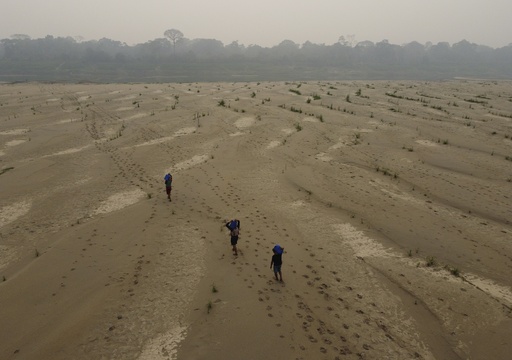BOGOTA, Colombia — The year 2024 proved to be devastating for the Amazon rainforest, plagued by rampant wildfires and severe drought conditions that severely impacted a vital ecosystem essential for mitigating climate change.
Climate warming exacerbated drought, leading to a surge in fires that resulted in the most destructive year for the forest since 2005. Authorities suspect that some of these blazes were intentionally set to facilitate land clearing for cattle ranching, significantly contributing to deforestation.
Covering an area twice the size of India and encompassing eight countries and one territory, the Amazon rainforest acts as a critical carbon sink, absorbing massive amounts of carbon dioxide that would otherwise exacerbate global warming. It houses approximately 20% of the planet’s fresh water and boasts extraordinary biodiversity, including around 16,000 known tree species. Nonetheless, governmental approaches have historically favored exploitation, often sidelining Indigenous rights and sustainability, with rising concerns about the encroachment of organized crime and individual exploitation.
“The fires and droughts in 2024 signal a potential ecological tipping point that we’ve long feared,” remarked Andrew Miller, advocacy director at Amazon Watch. “While the chance to reverse this trend is dwindling, it is not yet lost.”
Despite the dire circumstances, there were some positive developments. In both Brazil and Colombia, the rate of forest loss in the Amazon decreased. Furthermore, countries gathered at the recent United Nations conference on biodiversity reached an agreement to enhance the role of Indigenous groups in decisions concerning environmental conservation.
“For the Amazon to circumvent a tipping point, Indigenous peoples must be key players in that effort,” Miller added.
In Brazil, where the Amazon rainforest is most expansive, deforestation rates decreased by 30.6% compared to the previous year—marking the lowest peak of destruction in nine years. This decline occurred under the leadership of President Luiz Inácio Lula da Silva, contrasting sharply with the significant uptick in deforestation that occurred during the tenure of his predecessor, Jair Bolsonaro, who prioritized agricultural expansion over environmental protection.
Colombia also reported a noteworthy decline in deforestation rates as of July, though officials cautioned that trends for the remainder of the year might revert due to a spike in environmental degradation from ongoing drought linked to the El Niño phenomenon. Organizing economy and illegal activities remain persistent threats to forest conservation efforts in the Andean country.
“Organized crime poses a significant threat to conserving the Amazon,” explained Bram Ebus, a consultant with Crisis Group in Latin America. “Illicit gold mining has rapidly expanded, driven by increasing global prices, generating revenues that often outstrip government budgets aimed at controlling such activities.”
During August, Brazil experienced widespread smoke pollution that blanketed vast areas of the rainforest due to extensive fires. Historically, these fires have been utilized for land clearing and pasture management, with generated blazes mainly instigated by human actions.
The Amazon River also faced severe drops in water levels for a second consecutive year, pushing some nations to declare emergencies, while food and water distributions were initiated for beleaguered communities. The situation was acutely grim in Brazil, where one of the river’s primary tributaries hit record low levels.
Cesar Ipenza, an environmental attorney based in the Peruvian Amazon, expressed cautious optimism about the rising awareness regarding the Amazon’s indispensable function for global sustainability but echoed concerns regarding potential irreversible damage.
According to the Rainforest Foundation, the Amazon experienced unprecedented fire activity in 2024, with more than 37 million acres, an area larger than Iowa, being engulfed in flames between January and October. Bolivia alone reached a record number of fires within the same timeframe.
“The persistence of forest fires, especially during summer months, necessitates immediate action from authorities who currently lack effective responses,” Ipenza said. Venezuela, Colombia, Ecuador, and Guyana also reported increased instances of wildfires this year.
The recent UN conference on biodiversity, COP16, held in Colombia, shone a spotlight on the Amazon and fostered a groundbreaking agreement to amplify the Indigenous perspective within conservation planning, building on the push to acknowledge their crucial role in land preservation and climate action.
Experts Ebus and Miller pointed out the significance of choosing Martin von Hildebrand as the new secretary general for the Amazon Treaty Cooperation Organization during the conference.
“His expertise in Amazonian communities will be vital for uniting governmental efforts towards collaborative conservation,” Ebus noted. “If political will aligns, international partners may emerge to fund innovative strategies aimed at safeguarding the world’s largest tropical rainforest.”
Ebus stressed the necessity for Amazonian nations to collaborate more intensively—whether through joint law enforcement endeavors, forming rapid response teams for wildfires, or extending healthcare services to underserved Amazon border communities. Additionally, he emphasized the necessity for international support.
“The overall health of the Amazon is a shared global responsibility, as international consumer demand propels trade in commodities that contribute to both violence and environmental degradation,” he stated.
The upcoming year will be pivotal for the Amazon, as Belém do Pará in Brazil is set to host the first regional UN conference focusing on climate issues.
“Leaders from Amazonian countries have a unique opportunity to present their strategies while seeking concrete support,” Ebus added.



